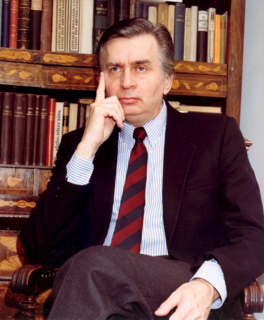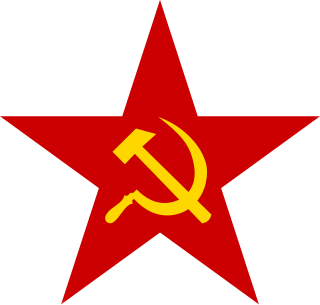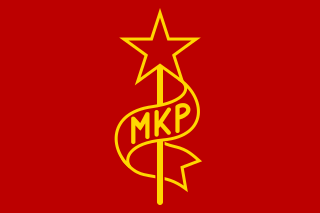
Bulgaria elects on national level a head of state - the president - and a legislature. The president is elected for a five-year term directly by the people. The National Assembly has 240 members, elected for a four-year term by proportional representation in multi-seat constituencies with a 4% threshold. Bulgaria has a multi-party system, in which no one party often has a chance of gaining power alone, and parties must work with each to form governments.
Parliamentary elections were held in Czechoslovakia on 26 May 1946. The Communist Party of Czechoslovakia emerged as the largest party, winning 114 of the 300 seats with 38% of the vote. This was the best performance for a Czechoslovak party up to that time; previously no Czechoslovak party had ever won more than 25 percent of the vote. Voter turnout was 93.9%. As it turned out, this was one of only two even partially free elections held in what would become the Eastern bloc, the other having been held in Hungary a year earlier. It would be the last free election held in Czechoslovakia until 1990.

Parliamentary elections were held in Macedonia on 18 October 1998, with a second round on 1 November. VMRO-DPMNE emerged as the largest party, winning 49 of the 120 seats, and later formed a coalition government with Democratic Alternative and the Democratic Party of Albanians.

Parliamentary elections were held in Hungary on 9 April 2006, with a second round of voting in 110 of the 176 single-member constituencies on 23 April. The Hungarian Socialist Party emerged as the largest party in the National Assembly with 186 of the 386 seats, and continued the coalition government with the Alliance of Free Democrats. It marked the first time a government had been re-elected since the end of Communist rule.

Parliamentary elections were held in Macedonia on 15 September 2002. The result was a victory for the Together for Macedonia, an alliance of the Social Democratic Union of Macedonia, the Liberal Democratic Party, the Democratic Party of Turks, the Democratic League of Bosniaks, the United Party of Romas in Macedonia, the Democratic Party of Serbs, the Democratic Union of Vlachs, the Workers-Peasant Party, the Socialist Christian Party of Macedonia and the Green Party of Macedonia, which won 60 of the 120 seats in the Assembly.

The 1990 Hungarian parliamentary elections were held in Hungary on 25 March 1990, with a second round of voting taking place in all but five single member constituencies on 8 April. They were the first completely free and competitive elections to be held in the country since 1945, and only the second free elections in the country's history. The conservative, nationalist Hungarian Democratic Forum (MDF) beat the liberal and more internationalist Alliance of Free Democrats, which had spearheaded opposition to Communist rule in 1989, to become the largest party in parliament. The Hungarian Socialist Party, the former Communist party, suffered a crushing defeat, winning only 33 seats for fourth place.

The Civic Democratic Party was a liberal political party in Hungary in the period following World War II
Constitutional Assembly elections were held in Bulgaria on 10 June 1990, with a second round for eighteen seats on 17 June. They were the first elections held since the fall of Communism the previous winter, and the first free national elections since 1931. The elections were held to elect the 7th Grand National Assembly, tasked with adopting a new (democratic) constitution. The new electoral system was changed from 400 single-member constituencies used during the Communist era to a split system whereby half were elected in single member constituencies and half by proportional representation. The result was a victory for the Bulgarian Socialist Party, the freshly renamed Communist Party, which won 211 of the 400 seats. Voter turnout was 90.3%.

Constitutional Assembly elections were held in Bulgaria on 27 October 1946. The elections served to elect members to the 6th Grand National Assembly, tasked with adopting a new constitution. The Fatherland Front, an anti-fascist coalition dominated by the Bulgarian Communist Party, had come to power in 1944 following a coup. Now that the Second World War was over and the monarchy abolished the communists wanted to adopt a new constitution. The Communists won a large majority, with 53.5 percent of the vote and 278 of the 465 seats. Voter turnout was 92.6%. This would be the lowest vote share that the Communists or the Fatherland Front would claim during the 43 years of undisguised Communist rule in Bulgaria. In subsequent years, the Fatherland Front would claim to win elections with unanimous or near-unanimous support.
Elections for the Constituent Assembly were held in Denmark on 5 October 1848. Of the 158 seats in the Assembly, 114 were elected and 44 appointed by the King. An additional 31 candidates were to come from the Duchy of Schleswig but were not elected due to the First Schleswig War.
Parliamentary elections were held in Greece on 16 December 1843. The elected body was also tasked with drawing up a constitution, following the 3 September 1843 Revolution. The Three-Party Coalition won almost half the seats in the 243-seat Chamber.

Parliamentary elections were held in Hungary on 25 and 26 January 1920. However, they were only held in 164 districts. After the Treaty of Trianon was signed, the 44 districts previously occupied by Romania voted between 13 June and 5 July, whilst the 11 districts occupied by Serbia did not vote until 30 and 31 October 1921. The election was held with compulsory voting. In protest at this and other changes to the franchise that left 60% of the voting age population unable to vote, the Hungarian Social Democratic Party boycotted the elections, and called for its supporters to cast invalid votes, resulting in an unusually high number of blank or invalid votes - 11.8% in the January elections and over 20% in Budapest and other major cities.

Parliamentary elections were held in Hungary between 8 and 15 December 1926. The result was a victory for the Unity Party, which won 161 of the 245 seats in Parliament. István Bethlen remained Prime Minister.

Parliamentary elections were held in Hungary between 28 and 30 June 1931. The result was a victory for the Unity Party, which won 149 of the 245 seats in Parliament. István Bethlen remained Prime Minister, but resigned on 24 August due to the effects of the Great Depression and was replaced by Gyula Károlyi.

Parliamentary elections were held in Hungary between 31 March and 7 April 1935. The result was a victory for the Party of National Unity, which won 164 of the 245 seats in Parliament. Gyula Gömbös remained Prime Minister.

Parliamentary elections were held in Hungary on 8 June 1985. The Hungarian Socialist Workers' Party was the only party to contest the elections, and won 288 of the 387 seats, with 98 of the remaining 99 going to independents selected by the party, whilst one seat remained unfilled until the following year.

General elections were held in Liechtenstein on 29 April 1945. Following the "silent elections" of 1939, they were the first to use the new proportional representation system. The Progressive Citizens' Party won eight of the 15 seats in the Landtag, but remained in coalition with the Patriotic Union.

Parliamentary elections were held in the Socialist Republic of Macedonia on 11 November 1990, with a second round on 25 November. They were the first competitive elections in the country's history. VMRO-DPMNE emerged as the largest party, winning 38 of the 120 seats.

Constituent Assembly elections were held in Portugal on 28 May 1911, following a coup in October 1910. The result was a victory for the Portuguese Republican Party, which won 229 of the 234 seats.

Parliamentary elections were held in Romania on 9 March 1975. The Front of Socialist Unity, dominated by the Romanian Communist Party and including other mass organisations, was the only organisation that contested the election. No prospective candidate could run for office without the Front's approval. The Front won all 349 seats in the Great National Assembly.


















